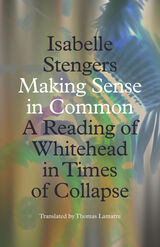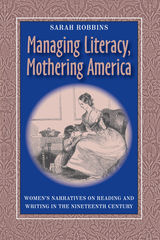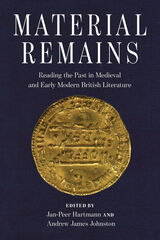3 start with M start with M

A leading philosopher seeks to recover “common sense” as a meeting place to reconcile science and philosophy
With her previous books on Alfred North Whitehead, Isabelle Stengers not only secured a reputation as one of the premier philosophers of our times but also inspired a rethinking of critical theory, political thought, and radical philosophy across a range of disciplines. Here, Stengers unveils what might well be seen as her definitive reading of Whitehead.
Making Sense in Common will be greeted eagerly by the growing group of scholars who use Stengers’s work on Whitehead as a model for how to think with conceptual precision through diverse domains of inquiry: environmentalism and ecology, animal studies, media and technology studies, the history and philosophy of science, feminism, and capitalism. On the other hand, the significance of this new book extends beyond Whitehead. Instead, it lies in Stengers’s recovery of the idea of “common sense” as a meeting place—a commons—where opposed ideas of science and humanistic inquiry can engage one another and help to move society forward. Her reconciliation of science and philosophy is especially urgent today—when climate disaster looms all around us, when the values of what we thought of as civilization and modernity are discredited, and when expertise of any kind is under attack.

Managing Literacy, Mothering America accomplishes two monumental tasks. It identifies and defines a previously unstudied genre, the domestic literacy narrative, and provides a pioneering cultural history of this genre from the early days of the United States through the turn of the twentieth century.
Domestic literacy narratives often feature scenes that depict women-mostly middle-class mothers-teaching those in their care to read, write, and discuss literature, with the goal of promoting civic participation. These narratives characterize literature as a source of shared knowledge and social improvement. Authors of these works, which were circulated in a broad range of publication venues, imagined their readers as contributing to the ongoing formation of an idealized American community.
At the center of the genre's history are authors such as Lydia Sigourney, Catharine Maria Sedgwick, and Frances Harper, who viewed their writing as a form of teaching for the public good. But in her wide-ranging and interdisciplinary investigation, Robbins demonstrates that a long line of women writers created domestic literacy narratives, which proved to be highly responsive to shifts in educational agendas and political issues throughout the nineteenth century and beyond.
Robbins offers close readings of texts ranging from the 1790s to the 1920s. These include influential British precursors to the genre and early twentieth-century narratives by women missionaries that have been previously undervalued by cultural historians. She examines texts by prominent authors that have received little critical attention to date-such as Lydia Maria Child's Good Wives--and provides fresh context when discussing the well-known works of the period. For example, she reads Uncle Tom's Cabin in relation to Harriet Beecher Stowe's education and experience as a teacher.
Managing Literacy, Mothering America is a groundbreaking exploration of nineteenth-century U.S. culture, viewed through the lens of a literary practice that promoted women's public influence on social issues and agendas.

The contributions to Material Remains: Reading the Past in Medieval and Early Modern British Literature examine the understanding and experience of temporality as registered through the representation of found objects. From Beowulf and King Arthur to Richard III, Roger de Norton, and more, these essays reproduce the thrill of the archaeological find and generate new forms of historical understanding beyond the established narratives that reinforce modern forms of periodizing the Middle Ages.
List of Contributors
Neil Cartlidge, Roberta Frank, Lori Ann Garner, Jonathan Gil Harris, Jan-Peer Hartmann, John Hines, Naomi Howell, Andrew Hui, Andrew James Johnston, Sarah Salih, Philip Schwyzer
READERS
Browse our collection.
PUBLISHERS
See BiblioVault's publisher services.
STUDENT SERVICES
Files for college accessibility offices.
UChicago Accessibility Resources
home | accessibility | search | about | contact us
BiblioVault ® 2001 - 2024
The University of Chicago Press









